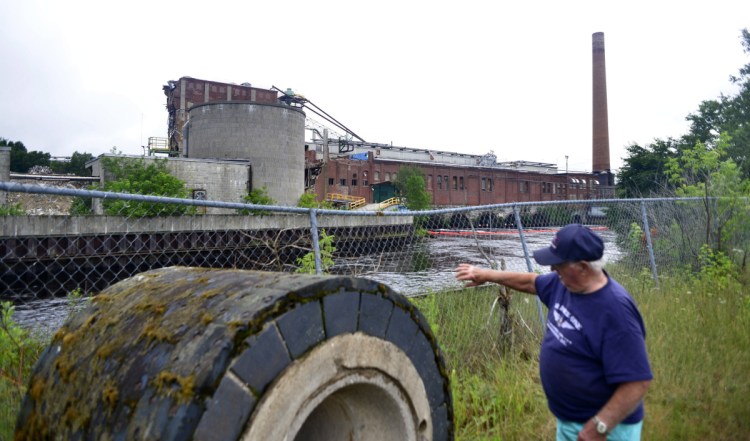Millinocket will receive more than $5 million from the federal government to set up a business park that could create over 100 jobs and bring millions of investment dollars into the struggling mill town.
The $5.3 million grant from the U.S. Department of Commerce will be used to build road, electrical, sewer and water infrastructure on the site of the former Great Northern Paper mill.
Local organizations hope to redevelop the 900-acre mill site into an industrial park hosting wood product manufacturing and high-tech data processing companies.

A worker runs the “winder” in 1986 at Great Northern Paper, which was once the biggest paper mill in the world before closing in 2008.
The project is expected to create 115 jobs and draw $205 million in investment to the area, according to the Commerce Department.
“This is the biggest economic investment in the area since Great Northern Paper made an over $100 million investment in paper machine No. 11 in 2001,” said Steve Sanders, director of mill site redevelopment with Our Katahdin, a community development nonprofit.
Our Katahdin purchased the former Great Northern Paper holdings in 2017 from Cate Street Capital for $1, intending to build a technology park on the property.
The federal grant will be supplemented with $1.4 million from Our Katahdin, Sanders said.
The federal award, however, is contingent on resolving a $1.4 million tax lien that the Internal Revenue Service has on the property.
“They won’t be able to access this money until the lien is removed. They are working pretty hard on that,” said Millinocket Town Manager John Davis. “I think it is going to happen, it is just taking time.”
Great Northern Paper’s Millinocket operation, once the biggest paper mill in the world, closed in 2008 and was mostly torn down and sold for scrap in 2013 and 2014.
Since the closure of the mill, along with another Great Northern Paper property in East Millinocket in 2011, the region has struggled with high unemployment and population loss. The two mills once employed 4,000 workers.

Employees drive away after finishing a shift. Local organizations hope to redevelop the 900-acre mill site in Millinocket into an industrial park.
But the promise of economic redevelopment and the boost of tourism spending from the nearby Katahdin Woods and Waters National Monument have some believing the area may be back on the upswing.
Even though the Millinocket mill is mostly gone, many physical assets remain, including hydroelectric power, clean water, a road into the northern Maine woods, rail access and wastewater capacity.
“All these natural competitive advantages inherent in the site are what we are trying to leverage with additional investment,” Sanders said.
The group is targeting manufacturers of traditional and advanced forest products, such as LignaCT, a composite-wood company that announced its move to the former mill site in February. But the group is also courting biorefineries, data centers and aquaculture companies, Sanders said.
“There is tremendous interest,” he said. “This mill at its peak employed 2,500 people. We are not going to get that all in one company, but the potential for over 1,000 over time is definitely feasible.”
Peter McGuire can be contacted at 791-6325 or at:
pmcguire@pressherald.com
Twitter: PeteL_McGuire
Send questions/comments to the editors.




Comments are no longer available on this story